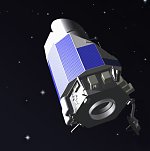Kepler discovers its first five exoplanets
Posted: Tue, Jan 5, 2010, 5:50 AM ET (1050 GMT)
 NASA's Kepler spacecraft, a mission designed ultimately to detect Earth-like planets around other stars, has discovered its first five exoplanets, scientists said Monday. The five planets are all "hot Jupiters", ranging in size from Neptune to bigger than Jupiter, and lie close to their parent stars, completing orbits in 3.3 to 4.9 days. All of the planets have high temperatures, with some exceeding the temperature of molten iron. Of particular interest to scientists is one planet, Kepler-7b, whose density is extremely low: approximately the same as styrofoam. Scientists said some kind of heating, from the star or from tidal friction, may be causing the planet to "puff out" and thus decrease its density. The discoveries come from the first six weeks of data collected by the spacecraft since it started science observations in May of last year; the discoveries were confirmed by follow-up observations by groundbased telescopes. Kepler is designed to look for exoplanets by detecting transits, when a planet passes between the star and observer, causing a minute drop in brightness; it simultaneously and continuously observes 150,000 stars in one area of the sky. Scientists hope that with enough data they will be able to detect planets as small as the Earth orbiting in the habitable zone of their stars.
NASA's Kepler spacecraft, a mission designed ultimately to detect Earth-like planets around other stars, has discovered its first five exoplanets, scientists said Monday. The five planets are all "hot Jupiters", ranging in size from Neptune to bigger than Jupiter, and lie close to their parent stars, completing orbits in 3.3 to 4.9 days. All of the planets have high temperatures, with some exceeding the temperature of molten iron. Of particular interest to scientists is one planet, Kepler-7b, whose density is extremely low: approximately the same as styrofoam. Scientists said some kind of heating, from the star or from tidal friction, may be causing the planet to "puff out" and thus decrease its density. The discoveries come from the first six weeks of data collected by the spacecraft since it started science observations in May of last year; the discoveries were confirmed by follow-up observations by groundbased telescopes. Kepler is designed to look for exoplanets by detecting transits, when a planet passes between the star and observer, causing a minute drop in brightness; it simultaneously and continuously observes 150,000 stars in one area of the sky. Scientists hope that with enough data they will be able to detect planets as small as the Earth orbiting in the habitable zone of their stars.
 NASA's Kepler spacecraft, a mission designed ultimately to detect Earth-like planets around other stars, has discovered its first five exoplanets, scientists said Monday. The five planets are all "hot Jupiters", ranging in size from Neptune to bigger than Jupiter, and lie close to their parent stars, completing orbits in 3.3 to 4.9 days. All of the planets have high temperatures, with some exceeding the temperature of molten iron. Of particular interest to scientists is one planet, Kepler-7b, whose density is extremely low: approximately the same as styrofoam. Scientists said some kind of heating, from the star or from tidal friction, may be causing the planet to "puff out" and thus decrease its density. The discoveries come from the first six weeks of data collected by the spacecraft since it started science observations in May of last year; the discoveries were confirmed by follow-up observations by groundbased telescopes. Kepler is designed to look for exoplanets by detecting transits, when a planet passes between the star and observer, causing a minute drop in brightness; it simultaneously and continuously observes 150,000 stars in one area of the sky. Scientists hope that with enough data they will be able to detect planets as small as the Earth orbiting in the habitable zone of their stars.
NASA's Kepler spacecraft, a mission designed ultimately to detect Earth-like planets around other stars, has discovered its first five exoplanets, scientists said Monday. The five planets are all "hot Jupiters", ranging in size from Neptune to bigger than Jupiter, and lie close to their parent stars, completing orbits in 3.3 to 4.9 days. All of the planets have high temperatures, with some exceeding the temperature of molten iron. Of particular interest to scientists is one planet, Kepler-7b, whose density is extremely low: approximately the same as styrofoam. Scientists said some kind of heating, from the star or from tidal friction, may be causing the planet to "puff out" and thus decrease its density. The discoveries come from the first six weeks of data collected by the spacecraft since it started science observations in May of last year; the discoveries were confirmed by follow-up observations by groundbased telescopes. Kepler is designed to look for exoplanets by detecting transits, when a planet passes between the star and observer, causing a minute drop in brightness; it simultaneously and continuously observes 150,000 stars in one area of the sky. Scientists hope that with enough data they will be able to detect planets as small as the Earth orbiting in the habitable zone of their stars.
Related Links:
| <<previous article | next article>> |
|
news in brief
|
|
Roscosmos replaces cosmonaut on next Crew Dragon mission to ISS
Posted: Sat, Dec 6 9:45 AM ET (1445 GMT) |
|
news links
|
|
Friday, December 26
How China powers its space endeavors
Xinhua — 9:48 am ET (1448 GMT) China's Long March-8A rocket launches internet satellites
Xinhua — 9:48 am ET (1448 GMT) Space Force guardians graduate basic training in their own uniforms for the first time
Task & Purpose — 9:13 am ET (1413 GMT) Florida's rocket launches break record, reaching triple digits in 2025
WMFE-FM Orlando — 9:13 am ET (1413 GMT) Japan's offensive space policy is extremely dangerous: spokesman
Xinhua — 9:06 am ET (1406 GMT) |